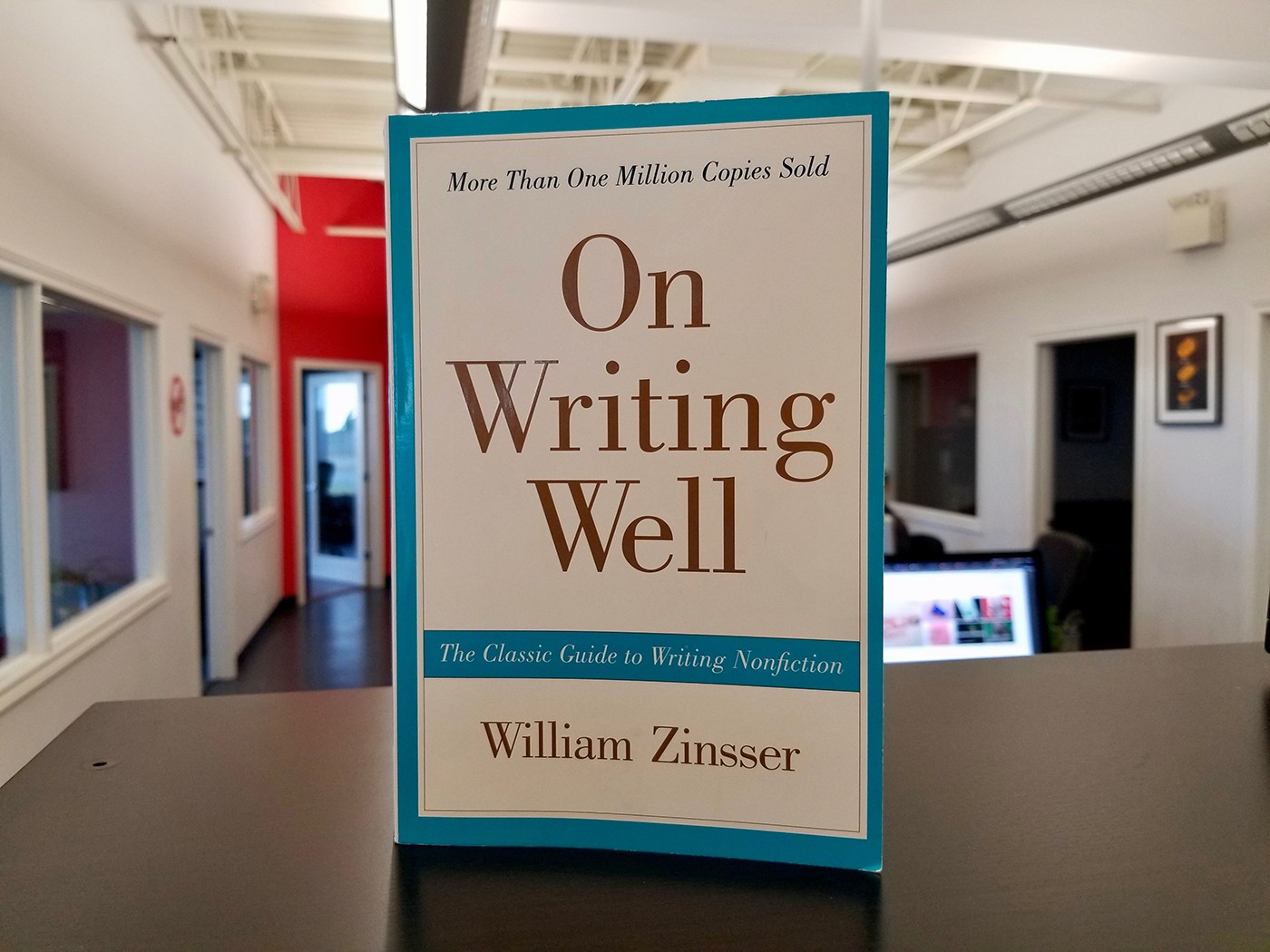Industry Insights
How to Strengthen Your Writing: Seven Simple Ways

It’s not William Zinsser's impressive list of accomplishments that make his writing so engaging. It’s his warmth, charm and charisma — and the fact that he speaks directly to you as a reader. I never once got bored while reading his book. And that’s likely because Zinsser practices what he preaches.
Before I was handed William Zinsser’s book, On Writing Well, I had never heard of the guy. But he has some serious writing cred. Starting his career writing for the New York Herald Tribune, he was soon known for his contributions to countless magazines, including Life, New York Times Magazine, Sports Illustrated, The New Yorker, The Atlantic and Condé Nast Traveler, all while teaching writing classes at Yale University. When he passed away in 2015 at the age of 92, he had written 18 books, ranging in topics from baseball spring training to the songwriters for American broadway shows. He even fought in Africa and Italy during World War II.
Here are seven of my major takeaways from the first 70 pages of the book, which covers writing principles and methods. Take these seven tips and put them to work whenever you write anything — your next email, a letter to clients, a blog post or a social media post!

1. The two tensions of the writing “transaction.”
Zinsser doesn’t state this outright, but this is what I took from the first chapter of the book, which covers the “transaction” of writing.
All of the writing anyone ever does is driven by two tensions to be managed. Zinsser points to these tensions as being…
- A compulsion to put yourself on paper and be vulnerable AND An inability to write what comes naturally — sounding stiff or rigid because of following rules too closely.
- Writing with personality, humanity and flair AND Writing in a way that’s engaging, interesting and valuable to the reader.
Basically, Zinsser thinks that the product that any writer has to sell is not the subject being written about, but who the writer actually is as a person. In other words, it’s not the topic that will keep someone coming back, but the enthusiasm of the writer!
“Good writing has an aliveness that keeps the reader reading from one page to the next, and it’s not a question of using gimmicks to ‘personalize’ the author. It’s a question of using the English language in a way that will achieve the greatest clarity and strength.”
2. “Clutter is the disease of [North] American writing.”
Zinsser constantly harps on simplicity in writing. Most amateur writing, academic writing, marketing copywriting or journalistic writing is chock full of clutter. Our challenge is to get rid of it.
His suggestions?
- Strip every sentence to its cleanest components. Remove any words that don’t serve a function.
- Clear thinking becomes clear writing. Remove clutter from how you think. (We’d suggest reading Rolf Dobelli’s book The Art of Thinking Clearly.)
- Constantly ask: “What am I trying to say?” Then, read what you’ve written and ask, “Have I said it?”
“Writing is hard work. A clear sentence is no accident. Very few sentences come out right the first time, or even the third time. Remember this in moments of despair. If you find that writing is hard, it’s because it is hard.”
3. Choose your words wisely.
“Journalese” is a concept that Zinsser talks about at length. He defines it as, “A mixture of cheap words, made-up words and clichés that are so pervasive that writers can hardly help using them.”
Some quick examples:
- Adjectives used as nouns (“greats,” “notables”)
- Nouns used as verbs (“to host”)
- Nouns chopped off to form verbs (“enthuse,” “emote”)
- Nouns padded to form verbs (“beef up,” “put teeth into”)
- Clichés of any sort
The solution to this problem lies in using uncommon words and phrases wisely but doing so in a way that’s still conversational (and easy to read). Zinsser gives us tactics to deal with this:
- Develop a respect for words and curiosity for their shades of meaning that is almost obsessive. You won’t make your mark as a writer otherwise. Care deeply about words. Read voraciously. Read what is being written today and what has been written by earlier masters. Use the dictionary and don’t be afraid of the thesaurus.
- Pay attention to how words sound. Your audience will read “out loud” even when it’s inside their head. Think about concepts like rhythm, timbre, cadence, flow and alliteration as you write.
- Always read a piece out loud. You’ll quickly find where the trouble in your writing lies.
- Never say something in writing that you wouldn’t be comfortable saying in everyday conversation.
“Bear in mind, when you're choosing words and stringing them together, how they sound. This may seem absurd: readers read with their eyes. But in fact they hear what they are reading far more than you realize.”
4. Use your words wisely too.
When is it okay to use one word over another? Good question. Zinsser tells us that the laws of usage are relative, bending with the taste of the lawmaker. Because of this relativity, usage has no fixed boundaries. These boundaries are hard to pin down simply because new words come into existence every day… and the way we talk changes every day too.
But there’s still hope! These tips can help you.
- There’s a tension to manage between oral language and written language. As time goes on, the things we say orally are becoming more acceptable as formal syntax. In 1961, Webster’s Dictionary argued that almost everything goes as long as somebody uses it, noting that “ain’t” is “used orally in most parts of the U.S. by many cultivated speakers.” Now, this depends on where you’re writing. But if it’s related to marketing, it’s safe to say that oral language is mostly fine.
- Be liberal in using new words and phrases, but conservative in grammar. Use new words if they’re still being used, but pay attention to the different (if slight) shades of meaning that each word or phrase conveys. By doing so, you’ll know how a word or phrase might change what your writing is saying. (Sidenote: a handy way to check how common a word is outside of your own personal experience is by using the Google Ngram Viewer. It’ll tell you how commonly a word is being used in a book and how it has trended over time. Try it!)
- Separate good word usage from jargon. Usage gives us a concrete image we can picture and jargon is nearly always abstract. From Zinsser: “I would say, for example, that ‘prioritize’ is jargon—a pompous new verb that sounds more important than ‘rank’—and that ‘bottom line’ is usage, a metaphor borrowed from the world of bookkeeping that conveys an image we can picture.”
- Remember, good words, as opposed to cheap words, are subjective. Trust your gut. If it sounds right when you read it out loud, it’s probably fine.
“In the end, it comes down to what is ‘correct’ usage. We have no king to establish the King’s English; we have only the President’s English, which we don’t want.”
5. Unify your writing before you start.
Unity is the anchor of good writing. Zinsser gives us three main “unities” that must align if your piece is going to be a good one.
- Unity of pronoun — Are you writing in the first person, as a participant (“I”), or in the third person, as an observer (“he,” “she,” “they”)?
- Unity of tense — Past tense, present tense or the hypothetical future tense? You can write in more than one tense, but there must be one that you use to principally address the reader. Choose one tense and stick with it.
- Unity of mood — Casual or formal? Any tone is acceptable, but don’t mix two or three.
To find these unities, ask yourself some basic questions before you start writing:
- In what capacity am I going to address the reader?
- What pronoun and tense am I going to use?
- What style?
- What attitude am I going to take toward the material?
- How much do I want to cover?
- What one point do I want to make?
With these answers in hand, you’ll be set to write clearly and effectively from the start, even if you change your plan halfway through.
“The last two questions are especially important. Most nonfiction writers have a definitiveness complex. They feel that they are under some obligation—to the subject, to their honor, to the gods of writing—to make their article the last word. It’s a commendable impulse, but there is no last word.”
6. You learn to write by writing.
You can only write well by practicing. As you practice, you’ll be able to identify common problems. Zinsser sums it up best:
“All writing is ultimately a question of solving a problem. It may be a problem of where to obtain the facts or how to organize the material. It may be a problem of approach or attitude, tone or style. Whatever it is, it has to be confronted and solved. Sometimes you will despair of finding the right solution—or any solution. You’ll think, “If I live to be ninety I’ll never get out of this mess.” I’ve often thought it myself. But when I finally do solve the problem it’s because I’m like a surgeon removing his 500th appendix; I’ve been there before.”
7. Bonus! Two important bits & pieces.
Active vs. passive voice
Always use an active verb unless you can’t get around a passive one. Passive voice isn’t grammatically incorrect, it’s just dull — it saps the reader of energy. “Joe saw him” is strong, while “He was seen by Joe” is weak. (If you care enough about this, you can learn more here.)
Concept nouns
This is something I had never heard of but found really insightful. Nouns that express a concept are commonly used in bad writing instead of verbs that tell what somebody did. Here are three typical dead sentences:
- The common reaction is incredulous laughter.
- Bemused cynicism isn’t the only response to the old system.
- The current campus hostility is a symptom of the change.
Notice anything? None of these sentences have any people in them. They also have no working verbs — only “is” or “isn’t.” The reader can’t visualize anybody performing any activity. All the meaning lies in impersonal nouns that embody a vague concept: “reaction,” “cynicism,” “response,” “hostility.”
BUT you can turn these sentences around. Just get people doing things.
- Most people just laugh with disbelief.
- Some people respond to the old system by turning cynical; others say…
- It’s easy to notice the change—you can see how angry all the students are.
These new sentences aren’t super exciting, either (mostly because the material is out of context). But at least they have real people and real verbs.
There is tons of useful advice in the book — this post only goes over the fundamentals. I highly recommend reading it if you do any form of professional writing. I intend on returning to it every few years. Or, if you’d rather have us do the writing for you, feel free to schedule a call.

Written by Dan Galenkamp
September 11, 2019